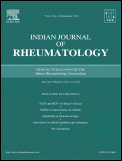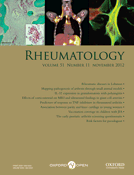
Rheumatology Advances in Practice
Scope & Guideline
Bridging research and practice for better patient outcomes.
Introduction
Aims and Scopes
- Clinical Management and Treatment Strategies:
The journal emphasizes research on various treatment modalities for rheumatic diseases, including pharmacological interventions, physical therapy, and lifestyle modifications. This focus aims to enhance patient outcomes through evidence-based management. - Patient-Centered Research:
A significant aspect of the journal is its commitment to patient-reported outcomes and experiences, highlighting the importance of understanding patient perspectives in managing rheumatic diseases. - Innovative Diagnostic Techniques:
The journal explores advancements in diagnostic methodologies, including imaging techniques and biomarkers, to improve the accuracy and timeliness of diagnoses in rheumatology. - Epidemiology and Public Health:
Research on the prevalence, incidence, and impact of rheumatic diseases on populations is a consistent theme, providing insights into the broader implications of these conditions on public health. - Interdisciplinary Approaches:
The journal promotes interdisciplinary research, encouraging collaborations across specialties to address the multifaceted nature of rheumatic diseases and their management.
Trending and Emerging
- Impact of COVID-19 on Rheumatology:
Research exploring the implications of the COVID-19 pandemic on patients with rheumatic diseases has surged, addressing concerns about treatment adherence, disease management, and overall health outcomes during the pandemic. - Mental Health and Chronic Illness:
There is a growing emphasis on the mental health aspects of living with rheumatic diseases, including studies on anxiety, depression, and the psychosocial impact of these conditions on patients. - Digital Health and Telemedicine:
The rise of telemedicine and digital health solutions in rheumatology practice has gained traction, with research focusing on the effectiveness of virtual consultations and digital tools for patient monitoring and engagement. - Personalized Medicine and Genetic Insights:
Emerging research on the genetic and molecular underpinnings of rheumatic diseases is gaining importance, reflecting a shift towards tailored treatment approaches based on individual patient profiles. - Lifestyle Interventions and Patient Empowerment:
There is an increasing focus on lifestyle modifications, including exercise and dietary interventions, as integral components of patient management, emphasizing the role of patient empowerment in treatment outcomes.
Declining or Waning
- Traditional Pharmacotherapy:
Research centered on conventional disease-modifying anti-rheumatic drugs (DMARDs) appears to be decreasing as newer therapies, including biologics and targeted synthetic DMARDs, gain prominence in rheumatological practice. - Basic Science and Pathophysiology:
There has been a noticeable reduction in publications focusing solely on the basic science aspects of rheumatology, such as cellular mechanisms and molecular studies, as the journal increasingly prioritizes clinical applications and patient outcomes. - Comparative Effectiveness Research:
While comparative studies on treatment effectiveness continue to be relevant, there is a shift towards more personalized medicine approaches, which may lead to fewer generalized comparative studies being published.
Similar Journals

Archives of Rheumatology
Pioneering research for better patient outcomes in rheumatology.Archives of Rheumatology is a premier peer-reviewed journal dedicated to advancing the field of rheumatology through the dissemination of high-quality research, reviews, and case studies. Published by the Turkish League Against Rheumatism, this open-access journal provides a platform for researchers, clinicians, and students to share insightful findings and innovative approaches in the diagnosis and management of rheumatologic diseases. With the goal of promoting knowledge exchange on a global scale, the journal welcomes submissions that enhance understanding and foster advancements in the clinical and biological aspects of rheumatic conditions. Each publication contributes significantly to the growing body of literature in this vital field of medicine, making Archives of Rheumatology an essential resource for both established and emerging researchers looking to stay abreast of the latest developments and clinical practices.

Indian Journal of Rheumatology
Connecting researchers and practitioners in the realm of rheumatology.Welcome to the Indian Journal of Rheumatology, a premier scholarly platform dedicated to advancing research and clinical practice in the field of rheumatology. Published by SAGE Publications Inc., this journal has been providing open access to its valuable content since 2006, promoting the dissemination of knowledge in India and beyond. As a voice in the rheumatology community, the journal addresses a wide range of topics including epidemiology, diagnostics, treatment strategies, and patient care in rheumatic diseases. Despite being classified in the Q4 category of the 2023 Scopus rankings, with a current position of Rank #57 among 73 journals, it serves as an essential resource for researchers, healthcare professionals, and students seeking to stay updated with the latest developments. The journal is committed to fostering scholarly dialogue and facilitating access to research that influences practice and improves patient outcomes in rheumatologic care.

Reumatologia Clinica
Connecting research and clinical excellence in rheumatology.Reumatologia Clinica is a distinguished journal dedicated to the field of Rheumatology, published by Elsevier España SLU. With its ISSN of 1699-258X and E-ISSN 1885-1398, the journal aims to disseminate pivotal research findings and clinical studies from 2005 to 2024, spotlighting advancements in the understanding and treatment of rheumatic diseases. Based in Barcelona, Spain, it plays a vital role in the academic community, ranking in the Q3 category for Rheumatology as of 2023, with a Scopus ranking of #44 out of 73, placing it in the 40th percentile. Although it operates under a traditional access model, the journal is committed to academic excellence, providing researchers, healthcare professionals, and students with invaluable insights that drive the field forward. Reumatologia Clinica serves as an essential resource for those looking to deepen their knowledge and contribute to the evolving landscape of rheumatologic research.

RHEUMATIC DISEASE CLINICS OF NORTH AMERICA
Navigating the complexities of rheumatology for better outcomes.Rheumatic Disease Clinics of North America is a premier journal published by W B Saunders Co-Elsevier Inc, dedicated to advancing the field of rheumatology through comprehensive and impactful research. With an ISSN of 0889-857X and an E-ISSN of 1558-3163, this esteemed publication has been disseminating knowledge since its inception in 1987, and continues to guide clinicians and researchers alike through its insightful articles and case studies. Positioned in the 2023 Q2 quartile for Rheumatology, it ranks #31 out of 73 journals in the Scopus category of Medicine _ Rheumatology, reflecting a commendable impact factor and relevance in the academic community. Although it does not offer open access options, the journal ensures that subscribers have access to cutting-edge research and reviews that address contemporary challenges and advancements in rheumatic disease. With its authoritative content, Rheumatic Disease Clinics of North America serves as a vital resource for those striving to improve patient care and clinical outcomes in the ever-evolving landscape of rheumatology research.

RHEUMATOLOGY INTERNATIONAL
Innovating clinical approaches for better patient care.Rheumatology International, published by Springer Heidelberg, is a prestigious journal that focuses on innovative research in the field of rheumatology and immunology. Established in 1981, this peer-reviewed journal has contributed significantly to advancing our understanding of autoimmune disorders, clinical approaches, and therapeutic interventions. It holds a commendable Q2 ranking in the categories of Immunology, Immunology and Allergy, and Rheumatology as of 2023, showcasing its influence and importance within these disciplines. With a robust Scopus ranking—positioned 14 out of 73 in Medicine Rheumatology—it caters to a diverse audience of researchers, clinicians, and students committed to improving patient care and treatment modalities. Although it does not currently offer open access options, the journal remains a vital resource for insights on contemporary challenges and breakthroughs in rheumatological research, published from its base in Heidelberg, Germany.

International Journal of Rheumatic Diseases
Fostering breakthroughs in rheumatic disease research.The International Journal of Rheumatic Diseases, published by WILEY, serves as a crucial platform for disseminating high-quality research and advancements in the field of rheumatology. With an ISSN of 1756-1841 and an E-ISSN of 1756-185X, this journal has established itself within the academic community since its inception in 2008, and it is set to continue until at least 2024. Positioned in the Q3 category of rheumatology, the journal holds a significant rank of #38 out of 73 in its field according to Scopus, showcasing its growing influence despite the competitive environment. The absence of Open Access reflects a traditional scholarly publishing model, allowing for meticulous peer-review processes to ensure the rigor and reliability of published studies. This journal aims to foster innovative research, critical reviews, and clinical studies, thereby contributing to a deeper understanding of rheumatic diseases and enhancing patient care. The dedicated readership, including researchers, healthcare professionals, and students, will find valuable insights into the latest findings and methodologies relevant to rheumatology in the journal's comprehensive articles.

RHEUMATOLOGY
Leading the Way in Rheumatic Disease Understanding and TreatmentRHEUMATOLOGY, published by Oxford University Press, is a leading journal in the fields of Pharmacology and Rheumatology, recognized for its significant contribution to advancing the understanding and treatment of rheumatic diseases. With an impressive impact factor and ranking within the top quartiles for both medical pharmacology and rheumatology, this journal serves as an essential resource for researchers, clinicians, and healthcare professionals. The journal spans an extensive publication history, with contributions from 1952 to 1995 and from 1998 to 2024, reflecting its enduring commitment to disseminating high-quality research. The Open Access option allows for broader dissemination of knowledge, enhancing the visibility of groundbreaking studies. Positioned in the United Kingdom, RHEUMATOLOGY not only offers valuable insights into the latest therapeutic advancements and clinical guidelines but also fosters collaboration across disciplines, ensuring that practitioners stay at the forefront of innovation in the management of rheumatic conditions.

Current Treatment Options in Rheumatology
Navigating the complexities of rheumatic treatments with expert reviews.Current Treatment Options in Rheumatology, published by SPRINGERNATURE, is a pivotal journal focused on advancing the field of rheumatology through the dissemination of cutting-edge research and comprehensive reviews. With an emphasis on current therapeutic strategies, this journal aims to provide healthcare professionals, researchers, and students with up-to-date information on the latest treatment modalities for rheumatic diseases. Although it operates under a subscription model, it offers a platform for sharing significant findings that can influence clinical practice and policy within the field of rheumatology. By promoting insightful discussions and collaborations, Current Treatment Options in Rheumatology plays a crucial role in shaping the future of rheumatic disease management and improving patient outcomes.

ARP Rheumatology
Advancing the Future of Rheumatology ResearchARP Rheumatology is a pioneering open-access journal dedicated to the field of rheumatology, published by the esteemed Sociedade Portuguesa Reumatologia. Since its inception in 2022, this journal has aimed to bridge the gap between research and clinical practice, providing a platform for the dissemination of high-quality research, case studies, and reviews that advance the understanding and management of rheumatic diseases. Although currently classified in the Q4 category of rheumatology journals with a Scopus rank of 56/73, our commitment to academic excellence and engagement with our readership is unwavering. Located in Portugal, ARP Rheumatology supports a global community of researchers, professionals, and students by maintaining rigorous peer-review standards and promoting innovative scientific discourse. With accessible content and a focus on the latest advancements in the field, ARP Rheumatology is poised to make a significant impact on the future of rheumatology research and practice.

Current Rheumatology Reports
Pioneering insights into rheumatological diseases.Current Rheumatology Reports is a premier journal dedicated to advancing the field of rheumatology, published by Springer. With an esteemed Q1 category ranking in Rheumatology as of 2023 and a remarkable Scopus rank of 6 out of 73, this journal stands at the forefront of research dissemination, boasting an impressive percentile ranking in the 92nd. Since its inception in 1999, Current Rheumatology Reports has provided a critical platform for the latest findings in rheumatological diseases, treatment strategies, and clinical practices. Although it currently does not offer Open Access options, the journal's rigorous peer-review process ensures high-quality publications that are essential for researchers, clinicians, and students alike. By keeping the community informed of key developments, this journal plays a vital role in shaping contemporary rheumatological research and practice, thereby facilitating the advancement of patient care worldwide.